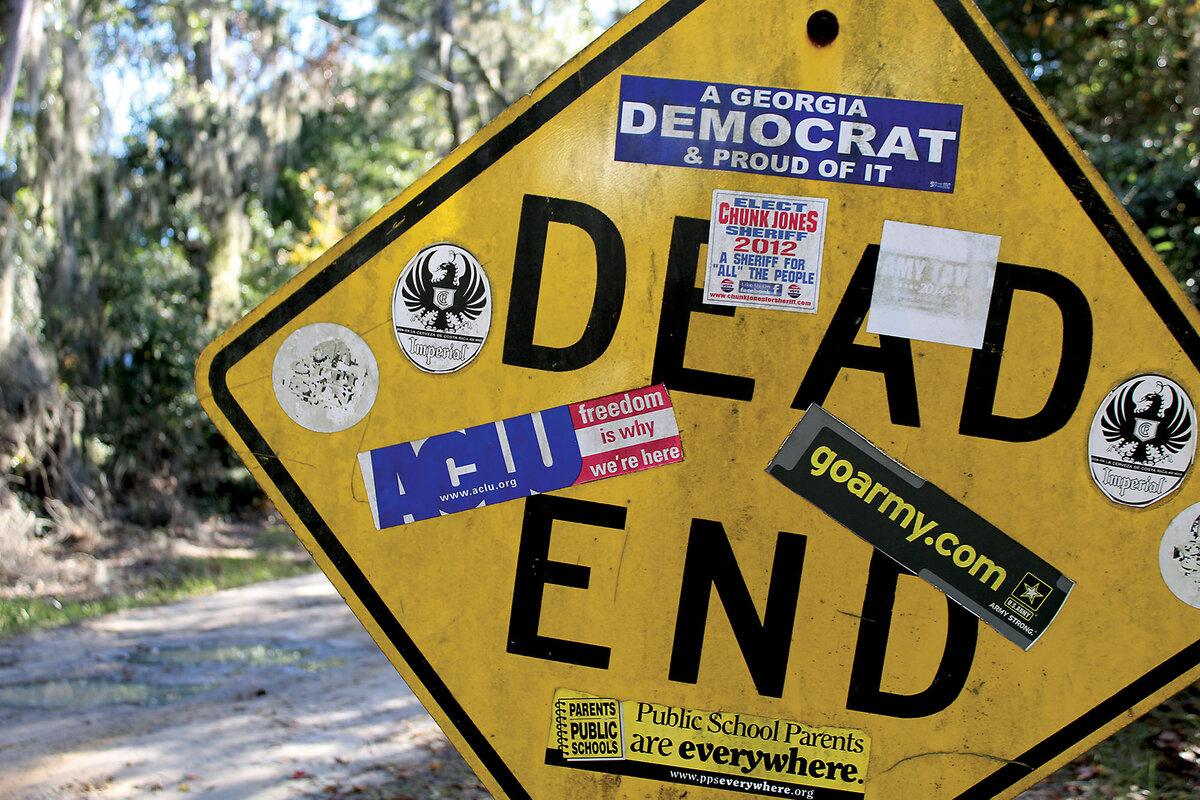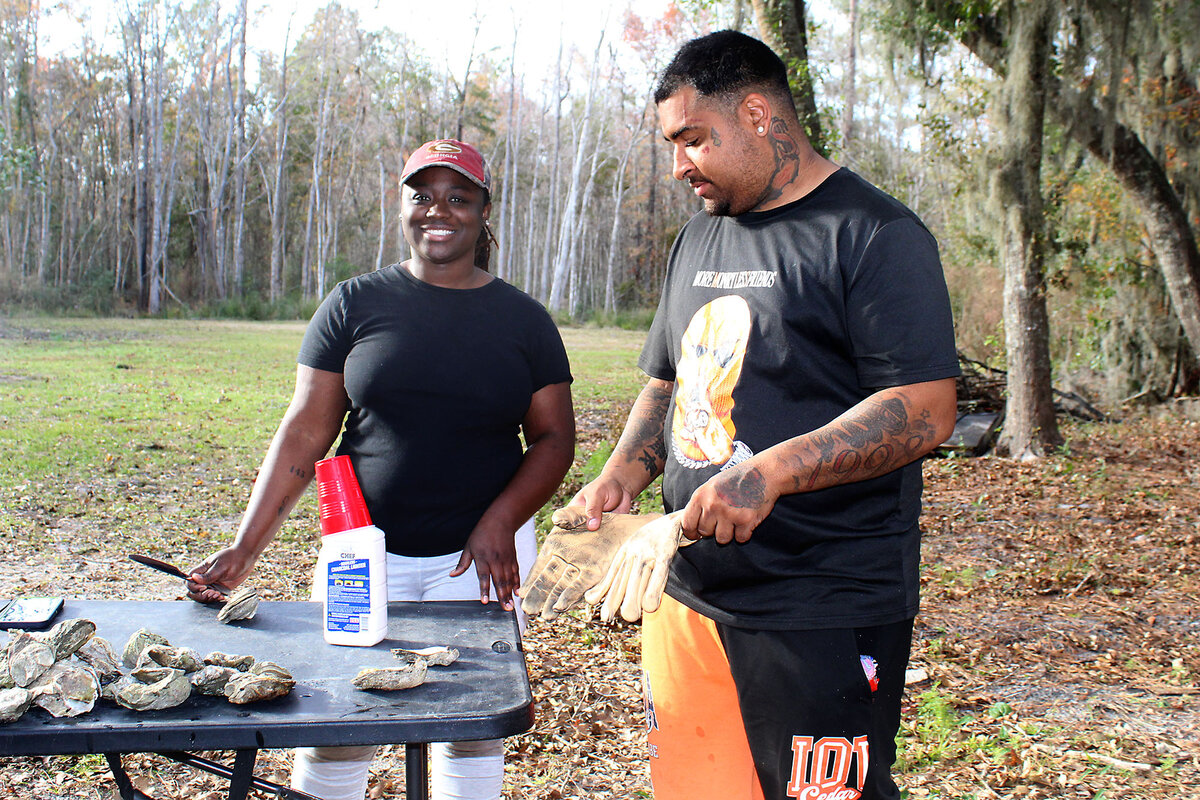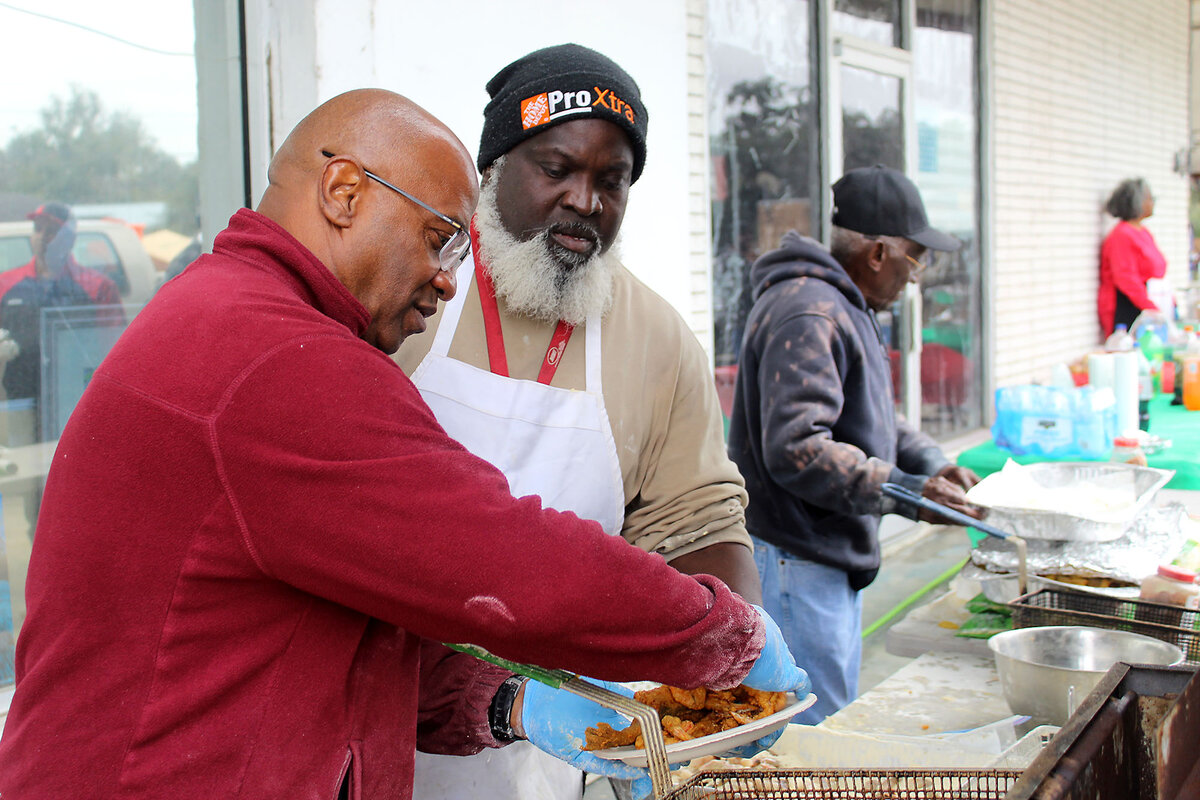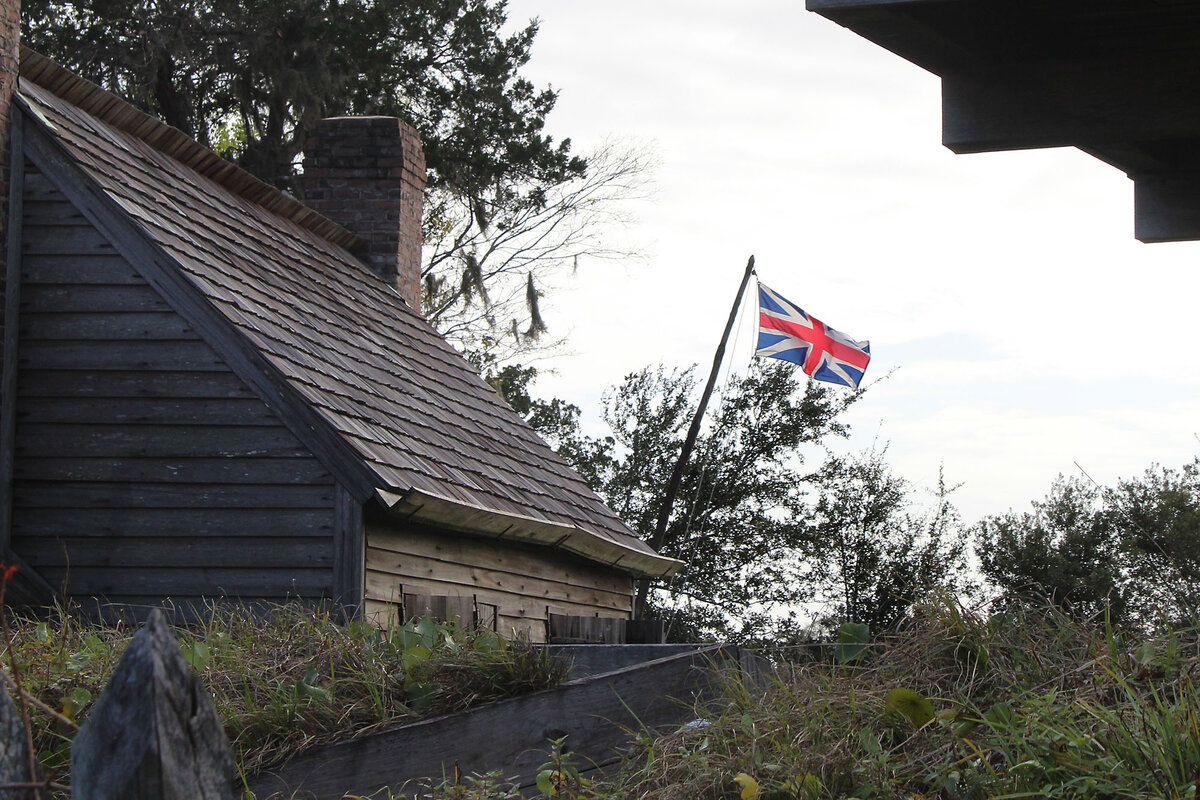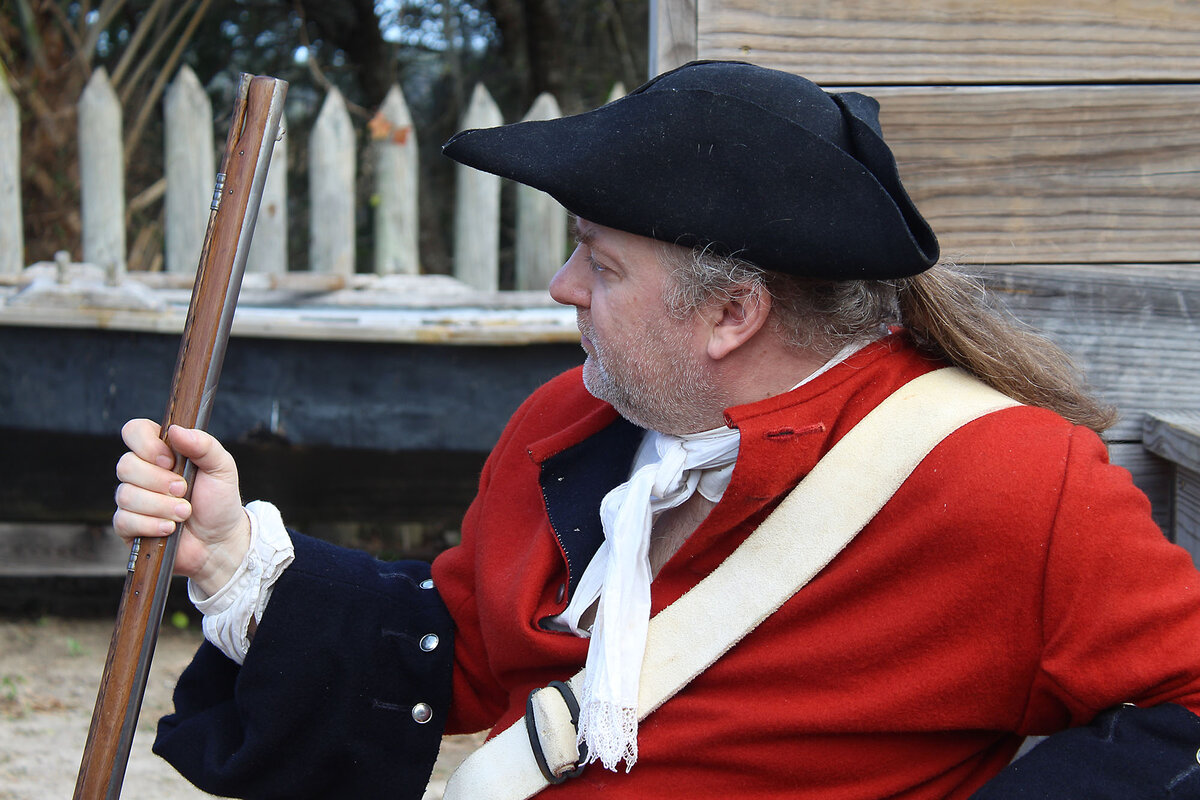Darien, Georgia, loves its history. How this small town sees inauguration.
| Darien, Ga.
When Darien, Georgia, was at the southern edge of the British Empire, the battle-hardened Scottish Highlanders who lived here helped hold the line against the Spanish at the Battle of Bloody Marsh in 1742.
That battle, though much exaggerated in local lore, was a British victory that ended any Spanish claims in Georgia. Those soldiers, among the first colonists of what would be a future American state, represent values still held in much esteem today: determination, industriousness, pride in heritage.
These values still infuse ideas about what it means to be an American in a place like Darien, the seat of McIntosh County on the southern Atlantic coast. A few hundred residents trace their bloodlines to those early Georgians, and are known locally as “direct descendants.”
Why We Wrote This
A story focused onThe people of Darien, Georgia, feel closely tied to their roots, whether their ancestors were Scottish Highlanders or the Gullah Geechee people. A reverence for the past comes up whenever they talk about the future of their community and country.
In 2024, Donald Trump won McIntosh County – with its shrimp boats docked amid vast marshes – earning nearly two-thirds of the vote. Many people believe his tough stances on trade could help a struggling fishing industry.
Some, too, liken his promises of tougher border enforcement and mass deportations to the actions of those early Scots, who stood up to the Spanish assault.
But voters in McIntosh County also elected a new sheriff – a Black Democrat named Thornell “T.K.” King. Mr. King, a retired State Patrol major, made his name giving away turkeys at Thanksgiving and presents for poor children on Christmas. He defeated a white candidate who was closely aligned with Mr. Trump.
“He has the right background, and he takes care of the community rather than just running a jail,” says Becky Owens, a local shopkeeper and ticket-splitter.
She voted for both winning candidates. In them, she says she saw a glimpse of a country that relied on its founding values and focused on progress within local communities. That doesn’t mean progress under President-elect Trump will be easy, Ms. Owens says.
“I am very excited” about Mr. Trump’s second inauguration, Ms. Owens says.
“But I also know that to make sure we still have a country, some people will have to leave and some people might be hurt,” she says of the prospect of mass deportations. “Right now, too much of politics is trying to make everybody happy.”
“And there’s no Middle America where people aren’t hurting right now,” she adds.
Here in Darien, her own role will be working to relieve the many inequities that still exist. It’s a place where white people have long dominated local politics – and its wealth. McIntosh County is 66% white and 31% Black.
So Ms. Owens says she’s stepping up her work at Charlie’s Place, a soup kitchen that helps feed the approximately 150 residents who live below the poverty line. She believes that part of the mission of the United States for the next four years should be also to resolve historical injustices.
She sees this as critical to America’s long-held focus on the pursuit of happiness as a key part of citizenship, if not of life.
Ashley Lewis, however, is not so sure a second Trump administration will focus on everyone’s pursuit of happiness. Ms. Lewis points to President-elect Trump’s past derogatory statements about people of color and Democratic areas of the country.
She traces her lineage to the Gullah Geechee people, descendants of West and Central Africans enslaved on plantations along the Atlantic coast. To hear the way Mr. Trump “others” people – such as immigrants, protesters, and Black people – not only hurts, Ms. Lewis says, but also threatens to drive America’s historic injustices even deeper.
Still, she says, the health of the economy matters a lot. “Our main focus as a family is on inflation. But prices have gotten better, including gas,” says the mother of grade schoolers.
She and her husband, Iddarion, just bought 50 pounds of local oysters for $75. “That was fair,” she says. They held a party, cooking the oysters on a piece of tin roofing over a fire, covering them with water-soaked burlap sacks to steam.
“I don’t think of it as politics”
Newly elected Sheriff King is heaving steaming baskets of fried shrimp and whiting onto paper plates, cutting a humble profile in a cornmeal-dusted sweater.
All around him in this small town on the Georgia coast, children and parents are streaming in for his 13th annual Christmas giveaway, where toy trucks and stuffed animals are there to bring the little ones some holiday cheer. For years, Mr. King has spearheaded events during Thanksgiving and Christmas, offering help and a smile to the impoverished residents in one of Georgia’s poorest counties.
“It’s interesting,” Mr. King says. “My opponent tried to make an issue of this. He said, ‘What does giving away turkeys and gifts have to do with public safety?’ I didn’t really know what he meant.”
Mr. King – a former state trooper and shrimp boat captain – says his campaign channeled the values of the Gullah Geechee descendants. He won the office of McIntosh County sheriff by focusing on perseverance, respect, and resourcefulness.
For many, his victory offers hope for building a community with shared values and mutual respect in this era of polarization and vitriol.
But it’s complicated. In some ways, Ms. Lewis’ unease is rooted in the history of how her ancestors survived in McIntosh County. It was not by winning battles to preserve an empire.
Through the past century, Black residents here have quietly demanded their rights and their due – a kind of Southern protest, coated in manners and grace, but at its core, a demand.
“The U.S., as it relates to Trump and identity, is such a big and volatile place, with lots of different regions and different people from different backgrounds, and some people like to think that all of this collective striving leads to harmony,” says Georgia Southern University historian Bennett Parten, author of “Somewhere Toward Freedom.”
“But the reality is that there are winners and losers, and people like Trump have found a way to prey on that competition – pitting one group against another,” says Dr. Parten. “In a sense, history is a seesaw between paying attention to our baser instincts and then, like Lincoln did, calling us to our better angels.”
The office of McIntosh County sheriff, in fact, also has a long, complicated, and very Southern history.
From the 1950s to 1970s, Tom Poppell, a white-haired charismatic sheriff, basically ruled the county from behind a set of sunglasses.
His father was the sheriff for over a decade before he took over in 1948. And when Mr. Poppell died in 1978, his wife took over as interim sheriff.
For 30 years, Sheriff Poppell was essentially above the law, historians say. He’d oversee looting operations on disabled tractor trailers on Highway 17. He once said that the way to control Black people was to keep them hungry.
But he also hired Black deputies and gave assistance to Black community members as well as white. “If you weren’t careful, he’d be your friend,” one saying went. “He just wrote his own law,” said another, according to local accounts.
Sheriff King’s father was among those early Black deputies hired by Sheriff Poppell.
“For most of this century, there was a strange racial calm in the county, consisting in part of good manners, in part of intimidation, and in part because the Sheriff cared less about the colors black and white than he did about the color green,” writes Melissa Fay Greene in “Praying for Sheetrock,” her award-winning history of McIntosh County’s civil rights era.
For his part, Mr. King is loath to talk politics. Yes, he ran as a Democrat, but in some ways that is because party affiliation is required for the office he will occupy, he says. “I don’t think of this as politics. I think of this as building a better community.”
A reenactor ponders his role in history
From 1721 to 1736, Fort King George was the southernmost outpost of the British Empire in North America.
Long hidden under a massive sawmill, the fort’s artifacts were unearthed in the mid-20th century by local historians. With a grant from the state, a replica of the original fort was built on McIntosh Road in Darien. The Union Jack flies over the old frontier outpost.
Resting with his musket on a Sunday afternoon about a month before inauguration, a redcoat reenactor, Michael Bagley, says the fort ultimately failed because of what those back then called the “miasma” – or “bad air.” Depression, loneliness, and drunkenness were other factors, historians say.
Not long after the fort was abandoned, Gen. James Oglethorpe, considered Georgia’s founder, recruited nearly 200 Scottish Highland families to build a town near its ruins. This became Darien.
Mr. Bagley cheerily acknowledges that his presence at Fort King George is full of contradictions and ironies.
He was born in Canada. His passion for historical reenactment helped him meet a woman who became his wife. They moved to Columbus, Ohio, and he became a U.S. citizen. As a reenactor, he specializes in the Queen Anne era and the War of 1812.
He quietly watches as a pirate reenactor claims that politics, not profiteering, drove pirates like him to hide from maritime law in the Georgia marshes. Mr. Bagley quickly pooh-poohs the reenactor’s claims: “They were in it for the money,” he says.
Despite the red coat, implying loyalty to a crown, the former punk rocker and current information technology security specialist is also a Democrat. And Mr. Bagley says he is still trying to come to terms with Mr. Trump’s victory. What does that mean and what does it say about the American people? he wonders.
In his view, if Americans fall too much in thrall to despotic behavior, “We know what can happen,” he says, “because we’ve seen it before.”
Mr. Bagley believes the best course of action right now is to do what he’s doing: sitting back, period rifle in hand, and waiting it out. He just worries he’ll be like the last two soldiers stationed at Fort King George before the English finally abandoned it: relegated to history’s dustbin.
More optimistically, he says, he will continue as a reenactor, reminding Americans that history provides a sense of distance as well as hope. It informs today’s struggles but doesn’t define them.
“I think we have gotten stuck with top-down kind of candidates, and what we need are bottom-up candidates,” Mr. Bagley says. “Top-down candidates protect the status quo and basically invite corruption. It results in too much infighting and enabling, and doesn’t really help solve our problems.”
For Ms. Owens, Ms. Lewis, Sheriff King, and Mr. Bagley, the second Trump administration represents, in different ways, a nation that seesaws between advance and retreat, between progress and reversion, and a necessary wrestling with the core question “What does it really mean to be American?”
“Every four years, we get to renew what society looks like, and in that there’s always the promise of what early America was – to start fresh and new,” says Professor Parten at Georgia Southern. “It’s a symbolic regeneration of our politics.”





